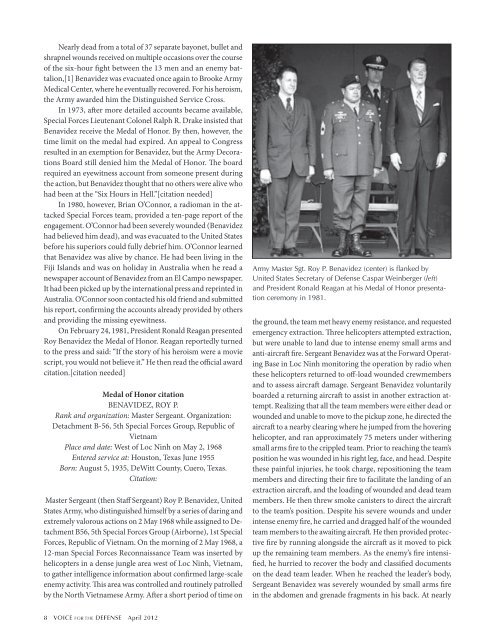for the defense for the defense - Voice For The Defense Online
for the defense for the defense - Voice For The Defense Online
for the defense for the defense - Voice For The Defense Online
You also want an ePaper? Increase the reach of your titles
YUMPU automatically turns print PDFs into web optimized ePapers that Google loves.
Nearly dead from a total of 37 separate bayonet, bullet andshrapnel wounds received on multiple occasions over <strong>the</strong> courseof <strong>the</strong> six-hour fight between <strong>the</strong> 13 men and an enemy battalion,[1]Benavidez was evacuated once again to Brooke ArmyMedical Center, where he eventually recovered. <strong>For</strong> his heroism,<strong>the</strong> Army awarded him <strong>the</strong> Distinguished Service Cross.In 1973, after more detailed accounts became available,Special <strong>For</strong>ces Lieutenant Colonel Ralph R. Drake insisted thatBenavidez receive <strong>the</strong> Medal of Honor. By <strong>the</strong>n, however, <strong>the</strong>time limit on <strong>the</strong> medal had expired. An appeal to Congressresulted in an exemption <strong>for</strong> Benavidez, but <strong>the</strong> Army DecorationsBoard still denied him <strong>the</strong> Medal of Honor. <strong>The</strong> boardrequired an eyewitness account from someone present during<strong>the</strong> action, but Benavidez thought that no o<strong>the</strong>rs were alive whohad been at <strong>the</strong> “Six Hours in Hell.”[citation needed]In 1980, however, Brian O’Connor, a radioman in <strong>the</strong> attackedSpecial <strong>For</strong>ces team, provided a ten-page report of <strong>the</strong>engagement. O’Connor had been severely wounded (Benavidezhad believed him dead), and was evacuated to <strong>the</strong> United Statesbe<strong>for</strong>e his superiors could fully debrief him. O’Connor learnedthat Benavidez was alive by chance. He had been living in <strong>the</strong>Fiji Islands and was on holiday in Australia when he read anewspaper account of Benavidez from an El Campo newspaper.It had been picked up by <strong>the</strong> international press and reprinted inAustralia. O’Connor soon contacted his old friend and submittedhis report, confirming <strong>the</strong> accounts already provided by o<strong>the</strong>rsand providing <strong>the</strong> missing eyewitness.On February 24, 1981, President Ronald Reagan presentedRoy Benavidez <strong>the</strong> Medal of Honor. Reagan reportedly turnedto <strong>the</strong> press and said: “If <strong>the</strong> story of his heroism were a moviescript, you would not believe it.” He <strong>the</strong>n read <strong>the</strong> official awardcitation.[citation needed]Medal of Honor citationBENAVIDEZ, ROY P.Rank and organization: Master Sergeant. Organization:Detachment B-56, 5th Special <strong>For</strong>ces Group, Republic ofVietnamPlace and date: West of Loc Ninh on May 2, 1968Entered service at: Houston, Texas June 1955Born: August 5, 1935, DeWitt County, Cuero, Texas.Citation:Master Sergeant (<strong>the</strong>n Staff Sergeant) Roy P. Benavidez, UnitedStates Army, who distinguished himself by a series of daring andextremely valorous actions on 2 May 1968 while assigned to DetachmentB56, 5th Special <strong>For</strong>ces Group (Airborne), 1st Special<strong>For</strong>ces, Republic of Vietnam. On <strong>the</strong> morning of 2 May 1968, a12-man Special <strong>For</strong>ces Reconnaissance Team was inserted byhelicopters in a dense jungle area west of Loc Ninh, Vietnam,to ga<strong>the</strong>r intelligence in<strong>for</strong>mation about confirmed large-scaleenemy activity. This area was controlled and routinely patrolledby <strong>the</strong> North Vietnamese Army. After a short period of time onArmy Master Sgt. Roy P. Benavidez (center) is flanked byUnited States Secretary of <strong>Defense</strong> Caspar Weinberger (left)and President Ronald Reagan at his Medal of Honor presentationceremony in 1981.<strong>the</strong> ground, <strong>the</strong> team met heavy enemy resistance, and requestedemergency extraction. Three helicopters attempted extraction,but were unable to land due to intense enemy small arms andanti-aircraft fire. Sergeant Benavidez was at <strong>the</strong> <strong>For</strong>ward OperatingBase in Loc Ninh monitoring <strong>the</strong> operation by radio when<strong>the</strong>se helicopters returned to off-load wounded crewmembersand to assess aircraft damage. Sergeant Benavidez voluntarilyboarded a returning aircraft to assist in ano<strong>the</strong>r extraction attempt.Realizing that all <strong>the</strong> team members were ei<strong>the</strong>r dead orwounded and unable to move to <strong>the</strong> pickup zone, he directed <strong>the</strong>aircraft to a nearby clearing where he jumped from <strong>the</strong> hoveringhelicopter, and ran approximately 75 meters under wi<strong>the</strong>ringsmall arms fire to <strong>the</strong> crippled team. Prior to reaching <strong>the</strong> team’sposition he was wounded in his right leg, face, and head. Despite<strong>the</strong>se painful injuries, he took charge, repositioning <strong>the</strong> teammembers and directing <strong>the</strong>ir fire to facilitate <strong>the</strong> landing of anextraction aircraft, and <strong>the</strong> loading of wounded and dead teammembers. He <strong>the</strong>n threw smoke canisters to direct <strong>the</strong> aircraftto <strong>the</strong> team’s position. Despite his severe wounds and underintense enemy fire, he carried and dragged half of <strong>the</strong> woundedteam members to <strong>the</strong> awaiting aircraft. He <strong>the</strong>n provided protectivefire by running alongside <strong>the</strong> aircraft as it moved to pickup <strong>the</strong> remaining team members. As <strong>the</strong> enemy’s fire intensified,he hurried to recover <strong>the</strong> body and classified documentson <strong>the</strong> dead team leader. When he reached <strong>the</strong> leader’s body,Sergeant Benavidez was severely wounded by small arms firein <strong>the</strong> abdomen and grenade fragments in his back. At nearly
















